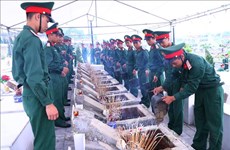Dutch project helps support women, children with HIV
More than 2,500 women, children and caregivers living with or affected by HIV have received support from a project run by the Netherlands-Vietnam Medical Committee.
More than 2,500 women, children and caregivers living with or affected by HIV have received support from a project run by the Netherlands-Vietnam Medical Committee.
The project on prevention of mother to child HIV transmission, especially in vulnerable women, ran from March 2009 to June this year, and received 1.7 million euros (2.1 million USD) in funding from the Dutch Embassy.
The project was implemented in seven northern cities and provinces, including Hanoi , Quang Ninh, Cao Bang, Thai Nguyen, Ha Giang, Dien Bien and Yen Bai.
The work saw the establishment of 14 support groups, including 12 for women living with HIV, one for elderly caregivers in Quang Ninh province, and one for injecting female drug users and sex workers in Hanoi .
Groups' members experienced an increase in economic support, through education, emergency services and revolving funds introduced by the programme.
The programme also offered small loans to women who wanted to start their own small businesses. Many successful small business activities saw the women play a greater role in contributing to their family income and their position in the household also improved.
The programme also strengthened the capacity of group members by offering training courses and exchange visits.
"Just a year ago, many people in my village did not dare to talk with me and my children since they knew my husband had died of AIDS," said a group member from Ha Giang province who wished to remain anonymous.
Staff from the Ha Giang AIDS Centre and the project's core members came to her village and discussed HIV/AIDS issues with others. Then they felt freer to communicate with her. Now her children can go to school, she said.
"Before, I thought HIV was the end and found no meaning in life," she said. "Now I realise that HIV is just a disease and we are luckier than victims of other diseases. I feel I am still a person and deserve to live a good life."
Le Thi Bich Hang, chairwoman of the Ha Giang Women's Union , said the programme has strengthened collaboration between the health, economic and social sectors.
"Before, we rarely worked with the provincial Department of Labour, Invalids and Social Affairs, but since the project started, collaboration has become much stronger as we have improved our way of working together," she said.-VNA
The project on prevention of mother to child HIV transmission, especially in vulnerable women, ran from March 2009 to June this year, and received 1.7 million euros (2.1 million USD) in funding from the Dutch Embassy.
The project was implemented in seven northern cities and provinces, including Hanoi , Quang Ninh, Cao Bang, Thai Nguyen, Ha Giang, Dien Bien and Yen Bai.
The work saw the establishment of 14 support groups, including 12 for women living with HIV, one for elderly caregivers in Quang Ninh province, and one for injecting female drug users and sex workers in Hanoi .
Groups' members experienced an increase in economic support, through education, emergency services and revolving funds introduced by the programme.
The programme also offered small loans to women who wanted to start their own small businesses. Many successful small business activities saw the women play a greater role in contributing to their family income and their position in the household also improved.
The programme also strengthened the capacity of group members by offering training courses and exchange visits.
"Just a year ago, many people in my village did not dare to talk with me and my children since they knew my husband had died of AIDS," said a group member from Ha Giang province who wished to remain anonymous.
Staff from the Ha Giang AIDS Centre and the project's core members came to her village and discussed HIV/AIDS issues with others. Then they felt freer to communicate with her. Now her children can go to school, she said.
"Before, I thought HIV was the end and found no meaning in life," she said. "Now I realise that HIV is just a disease and we are luckier than victims of other diseases. I feel I am still a person and deserve to live a good life."
Le Thi Bich Hang, chairwoman of the Ha Giang Women's Union , said the programme has strengthened collaboration between the health, economic and social sectors.
"Before, we rarely worked with the provincial Department of Labour, Invalids and Social Affairs, but since the project started, collaboration has become much stronger as we have improved our way of working together," she said.-VNA













